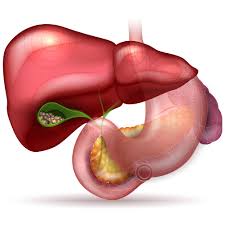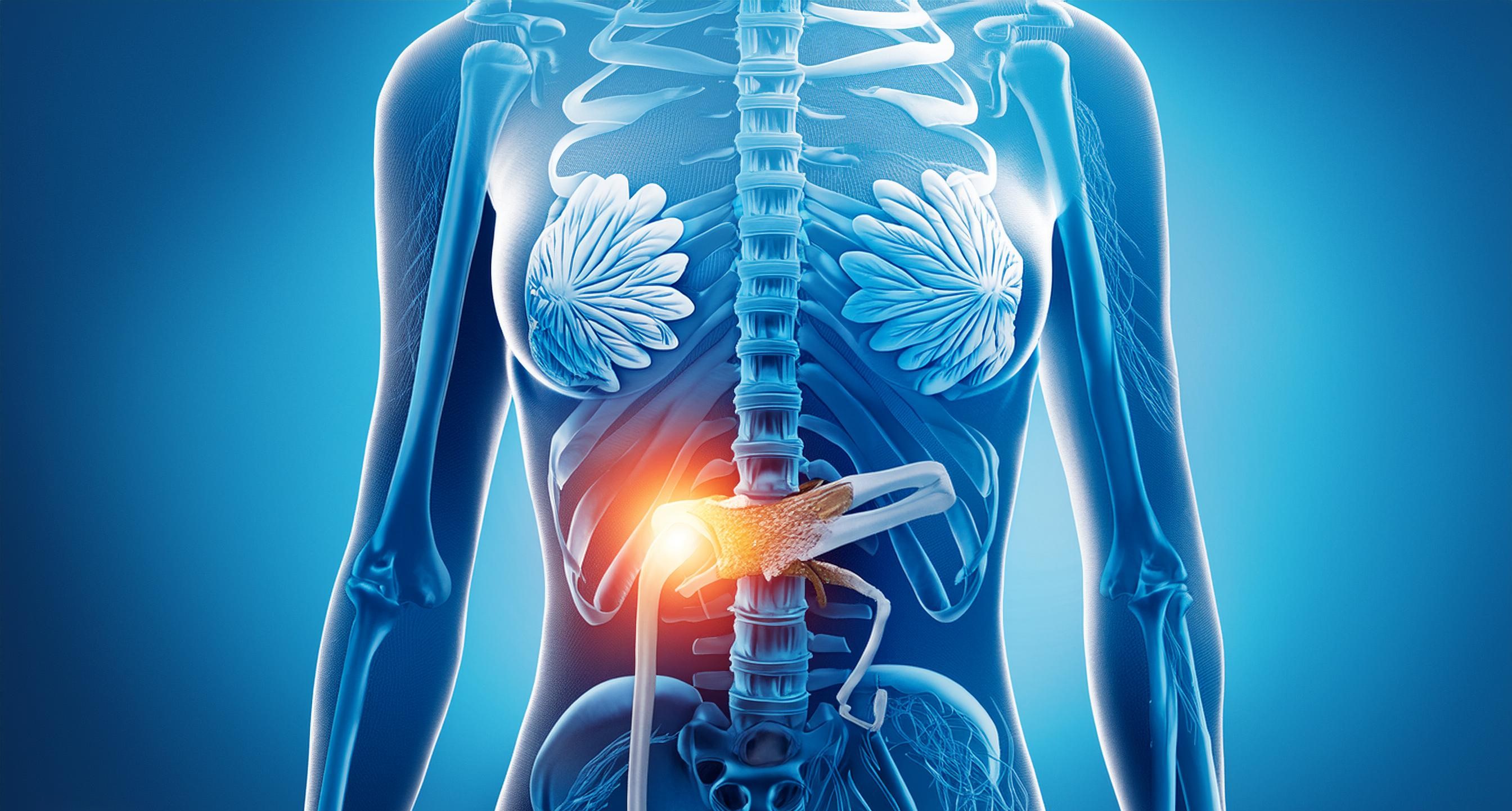One type of cancer called gallbladder cancer, develops in the gallbladder (GB), a small pear-shaped organ located below the liver. Bile, a stomach-related liquid created by the liver, is put away in the gallbladder and delivered into the small digestive system to help with the processing of fats. Cancer often starts in the innermost layer and can spread to other parts of the organ and nearby tissues. It can also spread (metastasize) to the liver, bile ducts, lymph nodes, or other abdominal structures nearby.
GB malignant growth is generally uncommon and frequently challenging to analyze in its beginning phases since it may not cause recognizable side effects. When side effects do happen, they can be like those of other gallbladder conditions, like gallstones or irritation of the gallbladder (cholecystitis).
Normal side effects of GB malignant growth might include:
1) Pain in the middle or upper right side of the abdomen.
2)Jaundice (yellowing of the skin and eyes).
3) An unintentional weight loss.
4)Nausea and retching.
5)Fever.
6)Abdominal bulging.
7) A decreased appetite
8)Itchy skin.
The exact cause of gallbladder cancer is not well understood, but certain risk factors may increase the likelihood of developing the disease.
These risk factors include
 Gallstones:
Gallstones:
Gallstones, huge ones or those that cause chronic inflammation of the gallbladder, are a significant risk factor for gallbladder cancer.
Age and gender:
Gallbladder cancer is more common in older adults and tends to affect women more than men.
Ethnicity:
Certain ethnic groups, such as Native Americans, Hispanics, and people from certain regions of South Asia, have a higher incidence of gallbladder cancer.
Obesity:
Being overweight or obese increases the risk of developing gallbladder cancer.
Chronic inflammation:
Conditions that cause chronic inflammation of the gallbladder, such as gallbladder polyps or chronic infections, may increase the risk.
Family history:
Having a close relative with gallbladder cancer may increase the risk.
Treatment options for gallbladder disease are determined by factors like the stage of the cancer, the patient's overall health, and individual preferences. Treatment could incorporate an operation to dispense with part or the whole of the gallbladder, chemotherapy, radiation therapy, assigned therapy, or a mix of these procedures.
Because this cancer is often diagnosed at an advanced stage when treatment options are limited, early detection and prompt treatment are important for improving outcomes. If you or someone you know is experiencing symptoms suggestive of GB cancer, it is important to seek medical attention for proper evaluation and diagnosis.
ROLE OF DIET:
Proper nutrition is crucial to the treatment and prevention of gallbladder cancer. While diet alone can't impede or fix gallbladder compromising turn of events, embracing a sound and changed diet can assist with supporting overall, ease secondary effects, and diminish the bet factors related to the infection. Here are several ways in which proper nutrition can impact gallbladder cancer:
Maintaining a Healthy Weight:
Gallbladder malignant growth is bound to happen in individuals who are overweight or obese. Subsequently, keeping a strong burden through genuine food and standard dynamic work can help with diminishing the bet of encouraging the disease.
Reducing the Risk of Gallstones:
Gallstones are a critical gamble factor for gallbladder disease. Certain dietary variables, like a high admission of healthy fats and low cholesterol, can reduce the risk of developing gallstones.
Consuming an eating regimen rich in organic products, vegetables, entire grains, and healthy fats, while restricting the admission of soaked and trans fats, can assist with diminishing the gamble of gallstone development.
Promoting Digestive Health:
An eating regimen high in natural products, vegetables, and entire grains, which are all high in fiber, can assist with guaranteeing normal solid discharges and sound processing. This could help forestall stopping up and bring down the gamble of creating gallstones.
Supporting Dietary Necessities during Treatment:
Individuals with a dangerous new development of the gallbladder., similar to a turn of events, chemotherapy, or radiation therapy, may encounter discretionary effects that influence their capacity to eat well. Appropriate food is major during harmful progress treatment to help the body's vitalizing necessities, remain mindful of coarseness and energy levels, and help in recuperation. A dietician can give redid sustenance ideas to help with directing treatment-related optional impacts and assurance of good enhancement utilization.
Reducing Inflammation:
The constant irritation of the gallbladder might expand the gamble of creating gallbladder malignant growth. Devouring an eating routine wealthy in mitigating food varieties, like natural products, vegetables, greasy fish, nuts, seeds, and olive oil, may assist with diminishing irritation in the body and lower the gamble of disease improvement.
Limiting Alcohol Consumption:
 Excessive alcohol usage is connected with an extended bet of gallbladder-threatening development. The gamble of fostering the sickness can be diminished by either polishing off liquor with some restraint or keeping away from drinking.
Excessive alcohol usage is connected with an extended bet of gallbladder-threatening development. The gamble of fostering the sickness can be diminished by either polishing off liquor with some restraint or keeping away from drinking.
Overall Health and Well-Being:
A healthy diet is important for everyday success and well-being, including saving important strong areas for a design, reducing the likelihood of other consistent problems, and moving forward. The body can get fundamental nutrients, minerals, cell reinforcements, phytonutrients, and different supplements from various supplement thick food sources, which can likewise assist with bringing down the gamble of creating malignant growth.
Some normal Fantasy and Truth:-
Myth: Consuming vivacious foods has negative effects on gallbladder development.
Fact: There is no direct evidence that consumption of spicy foods is associated with gallbladder cancer. Although spicy foods may worsen symptoms in people with gallbladder problems, there is no conclusive evidence that they cause cancer.
Myth: Eating fat and cholesterol increases the risk of gallbladder cancer(Ca GB).
Fact: A direct link between dietary fat/cholesterol consumption and the risk of cancer has not been established, even though obesity and a diet high in fat are risk factors for gallstones, which in turn can lead to Ca GB. It is vital to keep a fair eating routine to lessen the gamble of stoutness and related illnesses.
Myth: Detoxing less carbs or purifies can forestall or treat gallbladder malignant growth.
Fact: There is no coherent verification to help the case that detox eating less or cleanses can hinder or fix gallbladder sickness. When followed pointlessly, these weight reduction plans may not give adequate nourishment and might be adverse to generally speaking wellbeing.
Myth: A vegetarian or vegan diet can prevent gallbladder disease.
Fact: Although a plant-based diet has been associated with various health benefits, including a reduced risk of certain cancers, there is no conclusive evidence that a vegetarian or vegan diet specifically prevents gallbladder disease. However, a diet rich in fruits, vegetables, and whole grains can improve overall health and reduce the risk of cancer.
